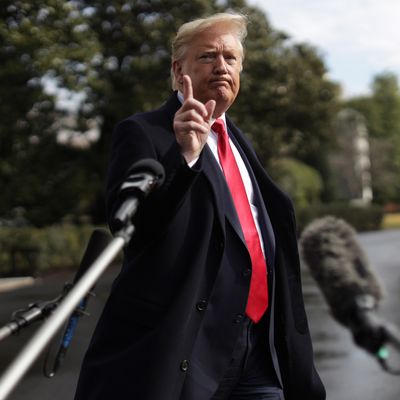
Donald Trump is in far more legal peril than most people understand. Just as his surprising victory over Hillary Clinton has made us unduly optimistic about his prospects of pulling out another comeback over Joe Biden, his ability to escape the Mueller investigation and impeachment has created an aura of impunity. But Trump does not have a magic power that enables him to stymie any investigation. The probes he is facing down right now are serious.
How serious? This afternoon alone, the New York Times and Washington Post both have reported stories revealing two apparently new financial crimes by Trump. These are in addition to the already-known crimes.
The Times story, mining its acquisition of the president’s tax returns, focuses on a $21 million payment he received during the 2016 campaign. The funds came at a time when Trump was draining his savings to self-fund his campaign and seemed to be in need of money. The $21 million came from “Trump Las Vegas Sales and Marketing,” a firm co-owned by Trump and his friend and political support Phil Ruffin, and which had “had little previous income, no clear business purpose and no employees.”
The reporters do not have quite enough information from the tax returns to prove a crime. But the circumstances seem difficult to explain legally. “Unless the payments were for actual business expenses,” tax lawyer Daniel Shaviro tells the Times, “claiming a tax deduction for them would be illegal.” And if the money was used to fund Trump’s campaign, which seems likely based on the timing, it would also constitute an illegal campaign donation. Trevor Potter, former chairman of the Federal Election Commission, believes the payments show evidence of Trump accepting an illegal campaign donation.
The Times does not have any reporting as to whether this payment is the subject of an ongoing investigation. But prosecutors are examining his financial information, and the chances that this deal reveals some criminal activity seem reasonably high.
The Post account is even worse. It covers a conservation easement Trump claimed on his Seven Springs estate north of New York City. Trump’s purchase of the property has already been reported as a potentially fraudulent tax deduction. He wrote off its cost as a business expense, but has reportedly used it as a vacation home, and the Trump Organization’s own website describes it as “a retreat for the Trump family.”
The new revelation concerns another tax deduction involving the property. Trump claimed a $21 million tax break for leaving the woodland surrounding the mansion undeveloped. The way a conservation easement works is that a person gives up the right to build something in order to preserve its natural beauty, and then gets to treat the value of the forfeited building as a charitable donation, which comes off their taxes.
Conservation easements are rife with fraud, and this one appears especially shady. Trump told the IRS he surrendered the chance to build 24 mansions on the land. But the Post reports in detail that building anything on that property was impossible, due largely to objections by neighbors. Which is to say, he was paid by the government not to build mansions that he never could have built.
The Seven Springs tax deduction is already the subject of an investigation by New York State attorney general Letitia James.
In his appearance today on “Rush Limbaugh,” where the president took time away from his regimen of Fox News to spend two hours talking with a completely different conservative broadcaster, Trump depicted the New York investigations as merely the latest witch hunt. “I had to beat off the phony Mueller report, I had to beat off all this stuff, I had to beat off impeachment, I had to beat off Congress, everything else … they then sent it to New York, which is all political … have to beat that off.”
Trump is going to have a lot on his hands.
Trump did beat off — actually, let’s just say, defeated — impeachment because the jury was Republican senators, who are accountable to his cult. And he defeated the Mueller report because Mueller followed a narrow strategy of completing already-established criminal investigations, did not examine Trump’s financial documents, and Trump was able to use his pardon power to persuade the two lieutenants most likely to have incriminating information, Paul Manafort and Roger Stone, to stay quiet.
None of these advantages pertain to his criminal exposure now. He is being pursued by authorities in New York. They are investigating state crimes, for which there is no pardon power. If they bring charges, the jury will be selected from New York residents whose careers do not depend on fending off challengers in a Republican primary. He might skate. But his previous success does not mean he will escape the law this time.






























